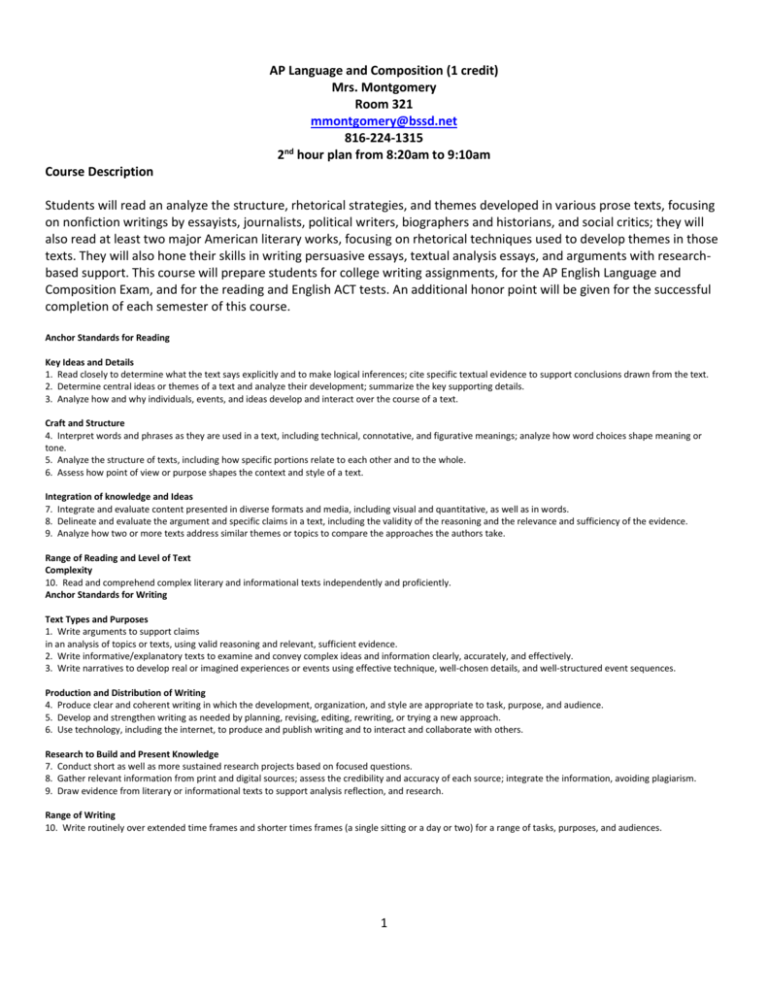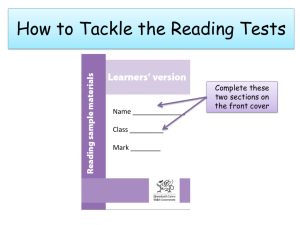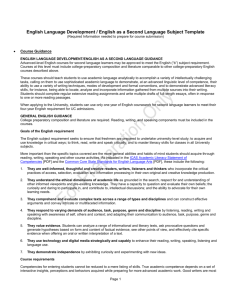AP Lang & Comp Syllabus
advertisement

AP Language and Composition (1 credit) Mrs. Montgomery Room 321 mmontgomery@bssd.net 816-224-1315 2nd hour plan from 8:20am to 9:10am Course Description Students will read an analyze the structure, rhetorical strategies, and themes developed in various prose texts, focusing on nonfiction writings by essayists, journalists, political writers, biographers and historians, and social critics; they will also read at least two major American literary works, focusing on rhetorical techniques used to develop themes in those texts. They will also hone their skills in writing persuasive essays, textual analysis essays, and arguments with researchbased support. This course will prepare students for college writing assignments, for the AP English Language and Composition Exam, and for the reading and English ACT tests. An additional honor point will be given for the successful completion of each semester of this course. Anchor Standards for Reading Key Ideas and Details 1. Read closely to determine what the text says explicitly and to make logical inferences; cite specific textual evidence to support conclusions drawn from the text. 2. Determine central ideas or themes of a text and analyze their development; summarize the key supporting details. 3. Analyze how and why individuals, events, and ideas develop and interact over the course of a text. Craft and Structure 4. Interpret words and phrases as they are used in a text, including technical, connotative, and figurative meanings; analyze how word choices shape meaning or tone. 5. Analyze the structure of texts, including how specific portions relate to each other and to the whole. 6. Assess how point of view or purpose shapes the context and style of a text. Integration of knowledge and Ideas 7. Integrate and evaluate content presented in diverse formats and media, including visual and quantitative, as well as in words. 8. Delineate and evaluate the argument and specific claims in a text, including the validity of the reasoning and the relevance and sufficiency of the evidence. 9. Analyze how two or more texts address similar themes or topics to compare the approaches the authors take. Range of Reading and Level of Text Complexity 10. Read and comprehend complex literary and informational texts independently and proficiently. Anchor Standards for Writing Text Types and Purposes 1. Write arguments to support claims in an analysis of topics or texts, using valid reasoning and relevant, sufficient evidence. 2. Write informative/explanatory texts to examine and convey complex ideas and information clearly, accurately, and effectively. 3. Write narratives to develop real or imagined experiences or events using effective technique, well-chosen details, and well-structured event sequences. Production and Distribution of Writing 4. Produce clear and coherent writing in which the development, organization, and style are appropriate to task, purpose, and audience. 5. Develop and strengthen writing as needed by planning, revising, editing, rewriting, or trying a new approach. 6. Use technology, including the internet, to produce and publish writing and to interact and collaborate with others. Research to Build and Present Knowledge 7. Conduct short as well as more sustained research projects based on focused questions. 8. Gather relevant information from print and digital sources; assess the credibility and accuracy of each source; integrate the information, avoiding plagiarism. 9. Draw evidence from literary or informational texts to support analysis reflection, and research. Range of Writing 10. Write routinely over extended time frames and shorter times frames (a single sitting or a day or two) for a range of tasks, purposes, and audiences. 1 Materials Needed blue or black pen, pencil, and paper in class each day. 3 ring notebook (no more than two inches tall) a Google account to be used for email communications and document creation. Classroom Policies and Expectations At this point in your academic career, you are capable of taking responsibility for yourself and for your education. By abiding by the following classroom procedures, you are practicing appropriate behavior for life after high school. The tardy policy is precisely aligned with the policy outlined in the student handbook. Late arrival to the workplace is unacceptable; therefore, it is unacceptable to be late to this class. Unless otherwise specified, assignments are due at the beginning of the class period. Late work is unacceptable. Again, failing to meet deadlines is not tolerated in college or the workplace. Points are deducted each day an assignment is missing. Students are made aware of long-term assignments well in advance. Absences prior to long-term deadlines do not result in a later deadline. If you are absent, you are responsible for initiating a conversation with me about making up any work missed. Use the bathroom in during passing periods. However, you are an adult and can judge for yourself whether or not you need to leave the room to use the restroom. Always ask permission before leaving the classroom. If you leave the classroom without permission, you will be considered truant. If you choose to abuse this bathroom privilege, you will lose the privilege of leaving the room during class. Course Outline Summer Assignment: Analyze how an author uses at least three rhetorical strategies and stylistic devices to develop the central claim or theme. It is strongly recommended you have completed four log entries by the first day of school (August 19). See specific assignment description for a list of texts from which to choose. Semester One Anchor Texts: The Crucible Miller All Over But the Shoutin’ Bragg In Cold Blood, Capote Feed Anderson Semester 2 Anchor Texts: Of Mice and Men Steinbeck Outliers Gladwell The Great Gatsby Fitzgerald A Streetcar Named Desire Williams *Please note: A student who wants an alternative reading assignment for a particular assigned book should explain to the teacher why he/she wants an alternative text, and the teacher will then work with the student to select an alternative text of comparable text complexity that addresses the objectives of the course and of the particular unit in which the assigned text is the focus. Grading Scale: 97-100%=A+ 93-96%=A 90-92%=A- 87-89%=B+ 83-86%=B 80-82%=B- 77-79%=C+ 73-76%=C 70-72%=C- 67-69%=D+ 63-66%=D 60-62%=D0-59%=F Please see the student handbook for guidelines related to academic integrity. Students may be subject to loss of full or partial credit. 2








